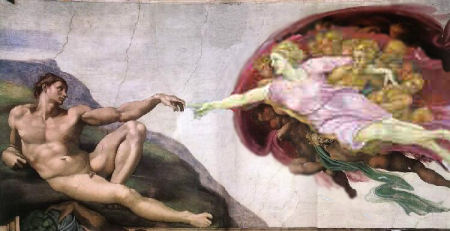
Whom To Thank?
I’ve developed the habit, during night prayer, to think of the people I’ve met and who have helped me during the day. They include clerks in stores, waiters, workers who’ve come to fix things in our home, our real-estate agent, doctors and dentists and if a weekend, the clergy and people I’ve been with at church.
Yes, most are getting paid for what they do, but they are still serving my needs and I’ve decided that the truly human response to their service is gratitude. As a believer, I also feel the need to thank the ultimate provider of those people and of their ability to serve.
In my youth, I was greatly inspired by the life of Helen Keller, whom I haven’t thought about in years. In case you’re unfamiliar with her, Wikipedia describes Keller as “an American author, disability rights advocate, political activist and lecturer.” She died in 1968.
At Sea in a Dense Fog
“…At 19 months old, Keller contracted an unknown illness described by doctors as ‘an acute congestion of the stomach and the brain.’ …Contemporary doctors believe it might have been meningitis…. It left her both deaf and blind. She lived, as she recalled in her autobiography, ‘at sea in a dense fog.’”
Yet, Keller accomplished great things in her life, writing 14 books and hundreds of speeches and essays on topics ranging from animals to Mahatma Gandhi. She campaigned for those with disabilities, for women’s suffrage, labor rights, and world peace.
When she was young, her teacher and companion, Anne Sullivan, introduced her to Phillips Brooks, an Episcopal clergyman, who introduced her to Christianity. Keller famously said about being introduced to God: “I always knew He was there, but I didn’t know His name.”
The Archetype of Gratitude
For me, Keller, though blind and deaf, is the archetype of gratitude. “So much has been given to me,” she said, “I have no time to ponder over that which has been denied.”
I’ve always been proud that the U.S. has Thanksgiving as one of its principal holidays. I know of no other country who has such a day, unless it has been copied from our Thanksgiving. Like many of our holidays, however, it has lost much of its original meaning. Instead, it seems to have become mostly about food.
The comedian, Jim Gaffigan, has a routine about holidays in which he imagines the originator of Thanksgiving saying, “Hey, why don’t we invent a holiday in which we overeat?” He then imagines someone answering, “But don’t we do that every day?”
Of course, many believers and non-believers actually do pay attention to the meaning of Thanksgiving and are aware of the need to be grateful. Those of us who are searching for God have more reason to be thankful, however, understanding that God is the ultimate giver. And while some may want to thank “the universe,” or simply be grateful to others, we must develop hearts that are permanently grateful to God.
The 10 Lepers
The need for gratitude, of course, is continuous and not dependent on a holiday. Jesus often spoke about this need. Perhaps the most famous instance was his cure of 10 lepers when on a journey to Jerusalem. He came across them in an unnamed village and after the cure, asked them to “go and show yourselves to the priests.”
One of them, a Samaritan – people who were outcasts in Israel – returned to thank Jesus, and Jesus observed, “Were not ten cleansed? Where are the nine?” Gratitude, then, is an essential ingredient in the search for God.
Fr. John Kwaku Brobbey, an African priest at a parish in West Des Moines, IA, is a perhaps unknowing kindred spirit of Hellen Keller. He wrote in a recent parish bulletin: “It is said that when life gives you a hundred reasons to cry, come up with a thousand reasons to smile. Let’s think differently and positively. We face our past without regrets but gratitude, and handle our present situations with confidence, prepare for the future with faith and let go of our fears.”





